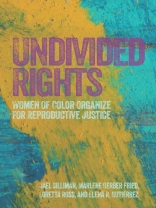Undivided Rights captures the evolving and largely unknown activist history of women of color organizing for reproductive justiceon their own behalf.
Undivided Rights presents a textured understanding of the reproductive rights movement by placing the experiences, priorities, and activism of women of color in the foreground. Using historical research, original organizational case studies, and personal interviews, the authors illuminate how women of color have led the fight to control their own bodies and reproductive destinies. Undivided Rights shows how women of color-starting within their own Latina, African American, Native American, and Asian American communitieshave resisted coercion of their reproductive abilities. Projected against the backdrop of the mainstream pro-choice movement and radical right agendas, these dynamic case studies feature the groundbreaking work being done by health and reproductive rights organizations led by women-of-color.
The book details how and why these women have defined and implemented expansive reproductive health agendas that reject legalistic remedies and seek instead to address the wider needs of their communities. It stresses the urgency for innovative strategies that push beyond the traditional base and goals of the mainstream pro-choice movementstrategies that are broadly inclusive while being specific, strategies that speak to all women by speaking to each woman. While the authors raise tough questions about inclusion, identity politics, and the future of women’s organizing, they also offer a way out of the limiting focus on ‘choice.’
Undivided Rights articulates a holistic vision for reproductive freedom. It refuses to allow our human rights to be divvied up and parceled out into isolated boxes that people are then forced to pick and choose among.
Об авторе
Marlene Gerber Fried (Ph D, Brown) is known nationally and internationally as a writer, lecturer, and advocate for reproductive justice. She was founding president of the National Network of Abortion Funds, served on the board of the Women’s Global Network for Reproductive Rights, and was Interim President of Hampshire College in 20102011. She is currently Faculty Director of CLPP (Civil Liberties and Public Policy Program). She edited
From Abortion to Reproductive Freedom:Transforming a Movement and is a co-author of
Undivided Rights: Women of Color Organize for Reproductive Justice. She received the first Marlene Gerber Fried Abortion Access Vanguard Award (NNAF, 2015), the Felicia Stewart Advocacy Award (APHA, 2014), and a Warrior Woman Award from Sister Song (2014).
Elena R. Gutiérrez is an associate professor of Gender and Women’s Studies and Latin American and Latino Studies at the University of IllinoisChicago. She is author of
Fertile Matters: The Politics of Mexican-Origin Women’s Reproduction and curator of the Reproductive Justice Virtual Library. She is committed to reproductive justice advocacy and documenting the activism of women of color.
Jael Silliman was a tenured associate professor of Women Studies at the University of Iowa from 1996 to 2002, where she worked on issues of race, reproductive rights and health, and gender and the environment in the United States and South Asia. She has published widely on these issues. Jael served as Program Officer for Reproductive Rights and Women’s Rights at the Ford Foundation in New York (20032009). She has been an activist in the transnational women’s movement for four decades and served on the boards of many women’s organizations. She is currently an independent scholar and writer documenting her community, the Bagdadi Jews of Calcutta, and has curated jewishcalcutta.in.
Loretta J. Ross was the National Coordinator of the Sister Song Women of Color Reproductive Justice Collective from 2005 to 2012. She has appeared on CNN, BET, Lead Story, Good Morning America, The Donahue Show, the National Geographic Channel, and Charlie Rose. She has been interviewed in the
New York Times,
Time,
the Los Angeles Times, and the
Washington Post, among others. She helped create the theory of reproductive justice in 1994 and led a rape crisis center in the 1970s. She co-authored
Undivided Rights: Women of Color Organize for Reproductive Justice in 2004.












